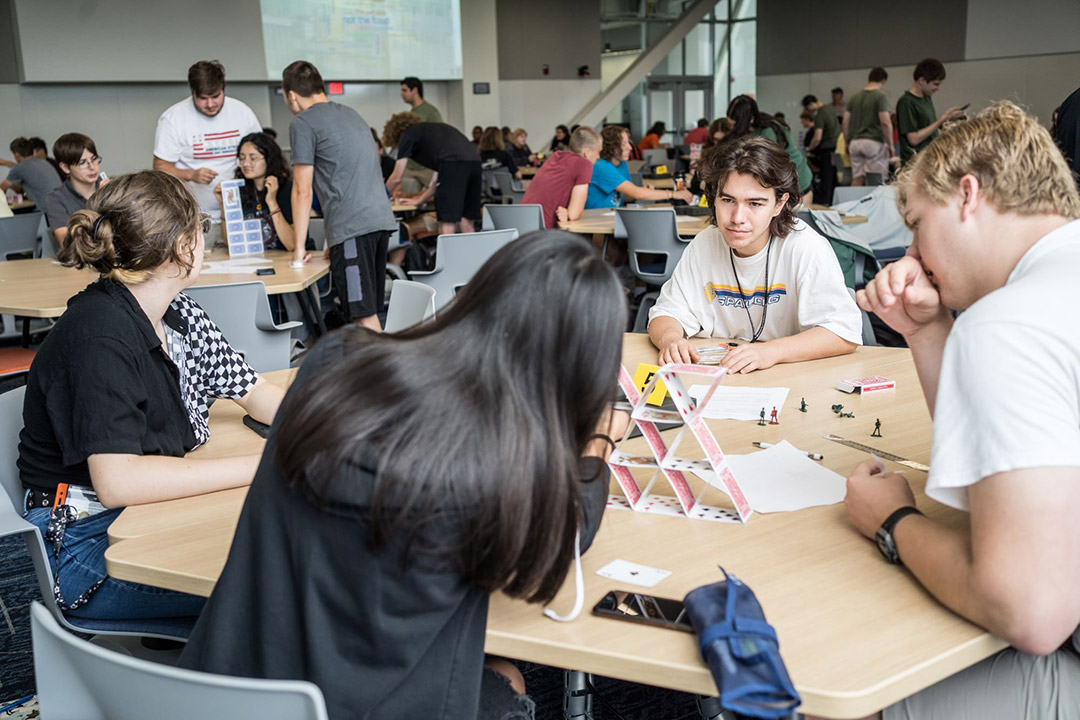RIT offers Summer Institute for Teaching and Learning and AI Symposium May 14-15
Workshops and presentations equip educators to teach the 21st-century student
Traci Westcott
Registration is open for the 2024 Summer Institute and AI Symposium, an annual celebration of teaching and learning at RIT. The event will be held May 14-15.
Collaborative, self-directed, and socially conscious are just a few of the characteristics that enable 21st-century students to thrive in today’s world. At RIT’s Summer Institute, educators are coming together to discuss best practices for teaching the next generation.
The 2024 Summer Institute for Teaching and Learning and AI Symposium will be held May 14-15, in the Student Hall for Exploration and Development (SHED) and Wallace Library. The free annual event is a celebration of teaching and learning, and is open to the RIT community. Registration is now open.
“There is a tremendous amount of innovation taking place in our classrooms and this is often hidden from colleagues,” said Neil Hair, executive director of the Center for Teaching and Learning. “At this event, faculty can explore the good work others are doing. It is coupled with discussions on making best use of technological developments like generative AI, the latest techniques for active learning, and using enhanced learning spaces like the SHED and redesigned Wallace classrooms.”
This year’s theme of “Teaching the 21st Century Student” will focus on innovative pedagogical approaches and strategies to meet the evolving needs of today’s learners. The event will feature workshops, presentations, demonstrations, and poster sessions. Topics will include:
- Helping Students Succeed—teaching students on the autism spectrum, teaching students with ADD/ADHD, microaggressions, inclusive teaching practices, alternative learning styles, and culture of care.
- Engaging Learning Experiences—active learning, effective teaching and learning strategies, reflections on the SHED, tools and techniques, and teaching large and small formats.
- Harnessing New Technologies—teaching with AI, alternative and creative ways to assess student performance, and how to utilize AI-powered learning management systems and technology to improve teaching and learning.
- Research in AI—enhancing student engagement and motivation through AI-driven learning experiences, addressing ethical considerations and biases in AI education, and supporting faculty professional development in AI integration.
For example, Garret Arcoraci, senior lecturer in the School of Information, and Robert Kostin, adjunct faculty in Golisano College of Computing and Information Sciences, are running a workshop tailored for educators interested in integrating AI into education.
“I will explore large language models—their functionality and their role in education—in hopes of alleviating some of the angst folks might have,” said Arcoraci. “We’ll also teach people how to leverage ChatGPT and MyGPTs to create a digital course tutor capable of offering instant feedback, personalized learning, and round-the-clock student support.”
The program will also include two keynote speakers. Kendra Evans, director of RIT’s Spectrum Support Program, will talk about fostering student success. Christina Katopodis, a senior postdoctoral research associate at City University of New York’s Humanities Alliance, will discuss taking student engagement to the next level with inclusive, collaborative learning.
The 2024 event is co-sponsored by RIT’s Center for Teaching and Learning and the RIT Research division.
Signup on the 2024 Summer Institute for Teaching and Learning and AI Symposium registration website.
